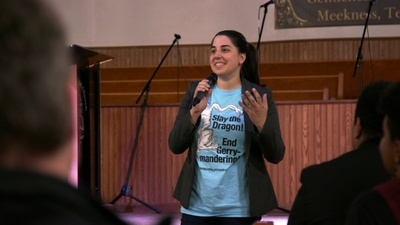This may be good and bad news, all rolled into one:
“Slay the Dragon” (shown here) – the praised documentary about Michigan’s anti-gerrymandering drive – was expected in a few theaters this weekend. Now, instead, it will have one release date, April 3, for theaters, video-on-demand and digital platforms.
“We saw what was happening with the spread of coronavirus and sat down with (the distributor) to discuss a last-minute change in our release plan,” the directors (Barak Goodman and Chris Durrance) said in a statement. The new plan, they said, means “nearly every home in America will have access.”
That reasoning could bring:
– Groans from film purists, including me, who feel movies should be seen in theaters, whenever possible. There have even been proposals to ban some Netflix films, for instance, from the Oscars, because of the short gap between theater openings and streaming.
– Approval from people who just want “Dragon” to be seen. The film views the art of drawing districts to get political advantage. Owen Glieberman of the Variety trade paper called it “the most important political film of (2019), and it may prove to be one of the key political films of the decade.”
In Michigan, it was named best documentary at the Traverse City and East Lansing film festivals. “It’s so exciting,” said Susan Woods, who has led the East Lansing festival for its 23 years. “It was the first time I felt that way watching a movie.”
The film triggers optimism about the political process. “It’s a story of what direct democracy and grassroots effort can do,” said Nancy Want, one of the key people in the movie.
Katie Fahey (shown here) was 27, with zero political experience, when she sent a social-media note: “I’d like to take on gerrymandering in Michigan. If you’re interested in doing this as well, please let me know.”
Many people did. Fahey was hoping for 3,000 volunteers, to get the 315,654 signatures needed to put a proposal on the ballot. She ended up with 4,000 volunteers and 420,000 signatures. The proposal drew 61 percent of the votes; after this year’s census, the re-districting will go to a non-partison commission.
